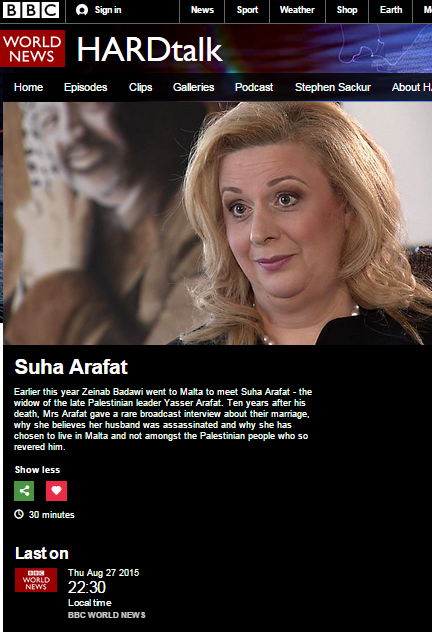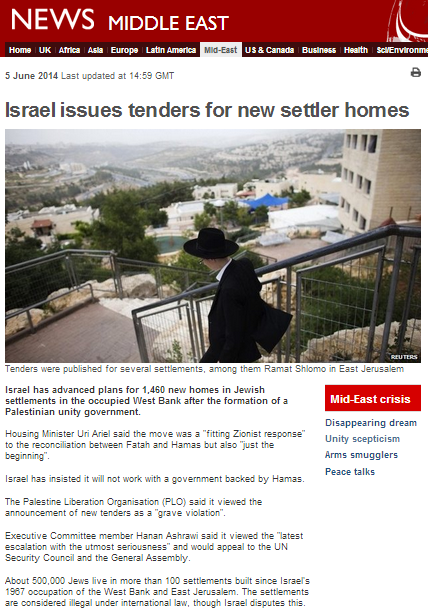Back in November 2014, the BBC Jerusalem Bureau’s Kevin Connolly presented listeners to BBC Radio 4 with a sympathetic cameo of a terrorist who had murdered an Israeli soldier in Tel Aviv a couple of weeks earlier.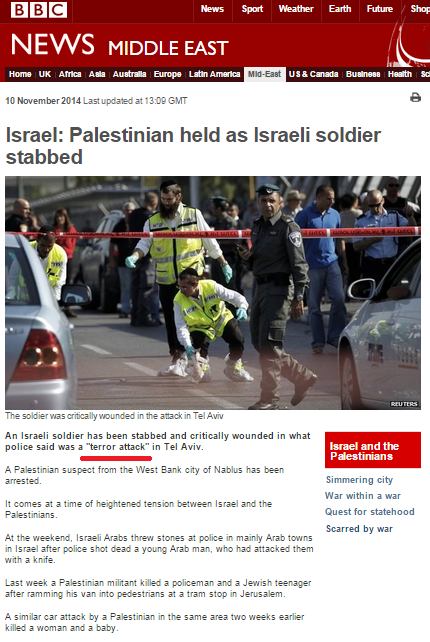
“[sound of a detonation] That was the Israeli army blowing up the house of one of the Palestinians who’ve run over and killed hitch-hikers, tram passengers and pedestrians in recent months. It’s a form of punishment the state has revived in Jerusalem in recent weeks. But punishment is easier than prevention. [sound of a radio broadcast in Hebrew] Take this crime. At a railway station a young Palestinian stabs an equally young Israeli soldier. […]
That young Palestinian was Nur Abu Hashem [sic], a jobbing painter and decorator who often came from his home at Nablus in the occupied West Bank to work without papers in Israel.
Nur Abu Hashem’s mother, Salsan [phonetic] waits with resignation for the inevitable demolition of her home. But worse for her than that are the nagging questions about how her popular son – a forgiving boy, she says – could have done what he’s accused of.”
On May 18th 2016 that “popular…forgiving boy” was convicted of the murder of First Sgt Almog Shiloni (who went unnamed in Connolly’s report).
“The Tel Aviv District Court ruled that the murder was premeditated.
The verdict described the murder as a “terrible and heart-rending affair in which the life of soldier Almog Shiloni was taken. The attack was not spontaneous in nature. He (Abu Khashiyeh) bought a knife at the flea market, and when he noticed the soldier he decided to execute his evil plan.”
“The defendant,” the verdict went on to say, “insisted on testifying, and in a short, focused and surprising testimony, after having pled not guilty, he abandoned his line of defense and admitted to all of the charges attributed to him.”
Abu Khashiyeh gave a chilling testimony during the trial, saying “It’s true that I murdered Almog Shiloni. I wanted to take his weapon and spray everyone because of what your rabbis are doing in al-Aqsa. I wanted to keep going, kill everyone on the street, continue everyone’s job. I murdered him. I planned to murder him.””
The indictment against Abu Khashiyeh stated that he “planned to murder a soldier in the hope of being killed and attaining the status of martyr.”
As ever, the BBC has not produced any follow-up reporting on that story and neither has it bothered to inform audiences who were told of the “inevitable demolition” of the terrorist’s family home that it never happened.
“The demolition order issued for Abu Khashiyeh’s house was throw[n] out a year later by the High Court of Justice. The judges determined that the long delay in carrying out the demolition—11 months from the day of the attack—is not reasonable and will therefore not lead to the deterrence sought.”
Another terrorist who – together with an accomplice – carried out a stabbing attack in Jerusalem’s Pisgat Ze’ev neighbourhood last October, was convicted last week.
“A Palestinian teenager who committed a stabbing attack in Jerusalem and was then falsely proclaimed dead by Palestinian President Mahmoud Abbas, was convicted on Tuesday morning of two counts of attempted murder at the Jerusalem District Court.
Ahmad Manasra committed the attack when he was 13 years old in October 2015, along with his 15-year-old cousin Hasan who was subsequently killed by police forces. The two stabbed and critically wounded 13-year-old Naor Shalev who was riding his bicycle, as well as another 21-year-old Israeli. […]
The indictment stated that Manasra returned from school and met his cousin. “They talked about the ‘situation’ at the Al-Aqsa Mosque and the state of the Gaza Strip residents, the PA and Hamas. Intending to help them, they decided to become martyrs and be killed as part of a religious war.””
At the time, the BBC’s Middle East editor Jeremy Bowen produced a sympathetic interview with the father of “typical teenager” Hasan Manasra.
“Khaled Mahania [sic] told me he had not replaced his son’s smartphone since he broke it last year. He had no mobile internet access, and none at home.
Khaled had even thrown out the TV because he believed his children should read and talk to each other. Khaled broke down as he said his son was a typical teenager, not political and certainly no radical.””
Both these terror attacks were carried out by teenagers who were influenced by the religiously themed incitement and conspiracy theories which the BBC repeatedly avoids addressing in a manner serious enough to enhance audience understanding of the issue.
In the same reports which featured Hasan Manasra’s father, Bowen told BBC audiences that: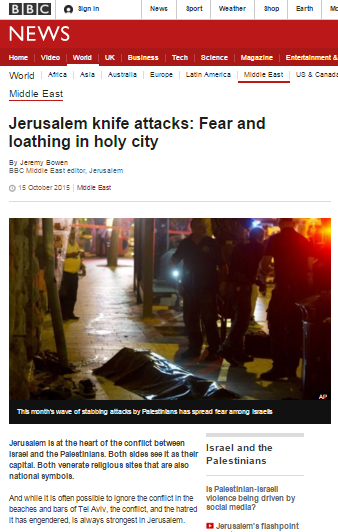
“Many Palestinians have told me they believe the reason for the attacks is that another generation is realising its future prospects will be crippled by the indignities and injustice of the occupation of the Palestinian territories, including East Jerusalem.”
And:
“Violence does not come out of the blue. It has a context. Once again, the problem is the unresolved conflict between Palestinians and Jews. It is at the heart of all the violence that shakes this city.
A big part of the conflict is the military occupation of the Palestinian territories, including East Jerusalem, that has lasted for nearly 50 years. It is impossible to ignore the effects of an occupation that is always coercive and can be brutal.
In successive Palestinian generations, it has created hopelessness and hatred. In some cases, that bursts out into murderous anger.”
Six months later, reports produced by Bowen on his latest trip to the region repeated the same mantra.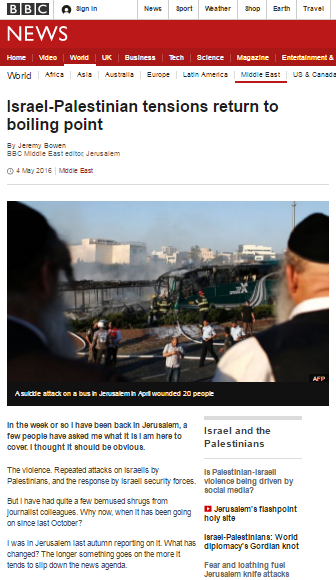
“But hundreds of conversations with Palestinians over many years here have convinced me that the biggest factor that shapes their attitudes to Israel is not the incitement to hate but the occupation of the Palestinian territories, including East Jerusalem, that started after Israel’s victory in the 1967 Middle East war.
When Palestinians who agitate against Israel find an audience, it is because of the way that the occupation, which is inherently violent, has overshadowed and controlled Palestinian lives for almost 50 years.”
The political agenda which lies behind the Middle East content gatekeeper’s presentation of this issue means that even when terrorists like those above and others clarify their motivations in their own words, BBC audiences receive no serious reporting on the central issues of incitement, glorification of terrorism and Palestinian Authority payments to terrorists and their families.
Related Articles:
Revisiting the BBC’s ‘explanation’ of the current wave of terror

